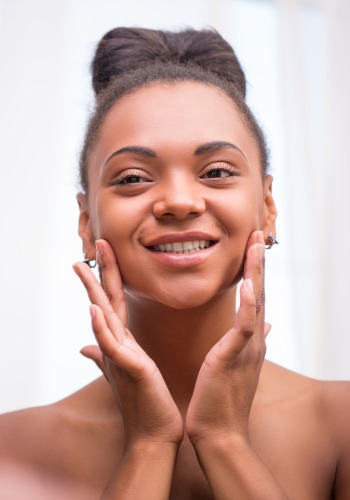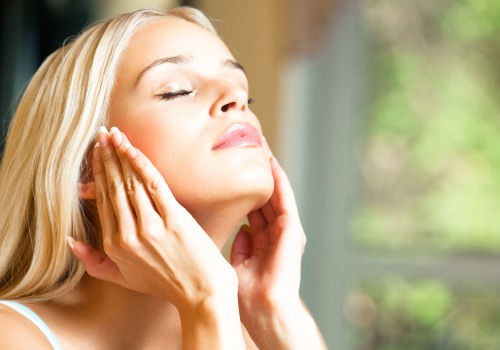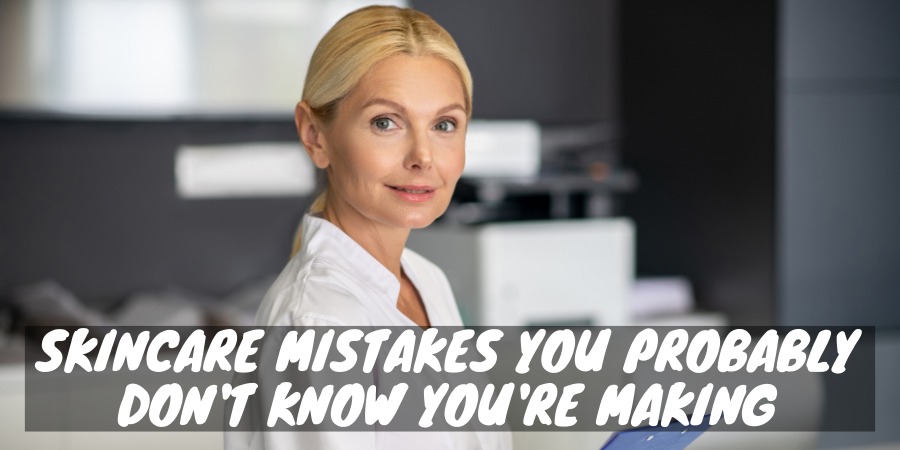You know all the “do”s of skincare: keep your face clean, wash your hair and pillowcases regularly, tailor your treatments to your specific skin type.
But what about the “don’t”s?
When it comes to skincare, the missteps you avoid can make just as big a difference as the precautions you take. And making even one mistake can sabotage your entire skincare routine.
Thankfully, most skincare mistakes are easy to fix once you’re aware of them. Here are nine of the most common skincare no-nos — and what to do instead.
Nine Common Skincare Mistakes You Need to Avoid
1. Going Overboard with Products and Treatments

With so many products advertising themselves as miracle cures for acne, wrinkles, dryness and other woes, it’s no wonder that so many people overdo their skincare.
But cleansing too often, for instance, can cause your skin to overproduce oils, creating a vicious cycle that only gets worse over time. The same goes for over-exfoliating and excessive application of retinoids.
Ideally, you should cleanse your skin at night, exfoliate two or three times a week and generally use products as little as possible. This allows your skin to balance itself out and become naturally healthy.
2. Heading to Bed Without Removing Your Makeup
After a long day, the last thing you want to do is take the time to remove your makeup before hitting the hay.
But even if you can’t muster the energy to perform your full evening routine, makeup removal is the one step you should never, ever skip.
Leaving your makeup on overnight prevents your skin from breathing, traps oils and clogs your pores. You’ll wake up with smeared makeup, huge pores and inflamed skin — not worth it!
3. Using Skincare Products in the Wrong Order

You’ve got all the necessary products in your arsenal, but if you use them in the wrong order, you might as well not use them at all.
Believe it or not, there’s no one-size-fits-all order for skincare product application. Rather, it’s best to apply your chosen products from thinnest to thickest, regardless of their active ingredients.
That’s because thinner products can’t penetrate through thicker ones to actually reach your skin. Your watery retinol serum won’t be absorbed if it’s applied on top of your thick moisturizer — it’ll just sit on top and do nothing.
Always start your routine with your thinnest, water-based products, then move on to the thicker, oil-based ones. You’ll see a huge difference in their effectiveness!
4. Skipping the Double Cleanse
Cleansing your face removes oil, dirt and other impurities. But if you’re only doing a single cleanse, you’re only getting half the benefits.
That’s why many dermatologists recommend double cleansing: using two different cleansers, one oil-based and one water-based, in succession at the start of your routine.
The oil-based cleanser does the heavy lifting, drawing oils and dirt out of your skin and carrying them down the drain. Then the water-based cleanser picks up any leftover grime and penetrates deeper to remove the most stubborn clogs.
Following up with a water-based cleanser also helps restore hydration and lets you address specific skin issues such as acne or roughness.
5. Using the Same Routine in the Morning and Evening
Once you’ve got your morning routine down pat, it can be tempting to perform it at night as well. Two birds, one stone, right?
Well, not really. Your skin has different needs at different times of the day, so if you use the same routine when you wake up and when you go to bed, your skin will suffer.
In the morning, protection is a priority: sunscreen, antioxidant serums and lightweight moisturizers are key here.
But at night, the goal is to remove the impurities your skin collected during the day, so heavy-duty cleansers and regenerative products are must-haves. Your skin is also more prone to moisture loss at night, so use a more powerful moisturizer before bed to keep it hydrated.
6. Exfoliating with Microbead Scrubs
Microbead scrubs are easy to find and often inexpensive, so it’s no surprise that so many people turn to them for exfoliation.
But while microbeads are great at removing dead skin, they frequently damage your new, fragile skin in the process. Microbeads can leave behind tiny tears that allow dirt and bacteria to reach the lower layers of your skin.
Additionally, plastic microbeads are environmental hazards that pollute the ocean, killing sea creatures and other wildlife. To save your skin and the planet, look for products that contain biodegradable beads, or use exfoliating pads.
7. Popping, Poking or Picking Pimples

You know you’re not supposed to pick or pop those pimples, but sometimes you catch yourself doing it anyway. It’s a tough habit to break, but for the sake of your skin, you have to try.
Any time you pick at your skin, you’re irritating it and stretching it out. This leads to wrinkles, inflammation and scarring — and it doesn’t have any benefits other than a second of satisfaction.
So keep those fingers away from your face. Your skin will thank you later!
8. Not Moisturizing After Cleansing
If you have oily skin, you may be tempted to leave moisturizing out of your skincare routine. After all, you just got rid of all that oil on your face, so why would you put it back?
The problem is that cleansers strip oils from your face so effectively that your skin can go into panic mode afterwards. Your oil glands start working double-time to replace the oils you cleansed away, and before you know it, you’re greasy again.
Hydration is as critical for your skin as it is for your body. Don’t skip it — thirsty skin can never be truly healthy!
9. Going Outside Without Applying SPF
If you spend any time at all exposed to the sun, whether directly or through a window or windshield, you need to use sunscreen. Those UV rays are no joke, and the more your skin absorbs them, the more damage it takes.
Sun exposure may give you a glowing tan in the short term, but in the long term, it’ll give you wrinkles, discoloration, and even skin cancer.
That’s why the final step of your morning skincare routine should always be sunscreen. Use a broad-spectrum sunscreen that’s rated at SPF 30 or higher, and reapply it throughout the day for ongoing protection.

